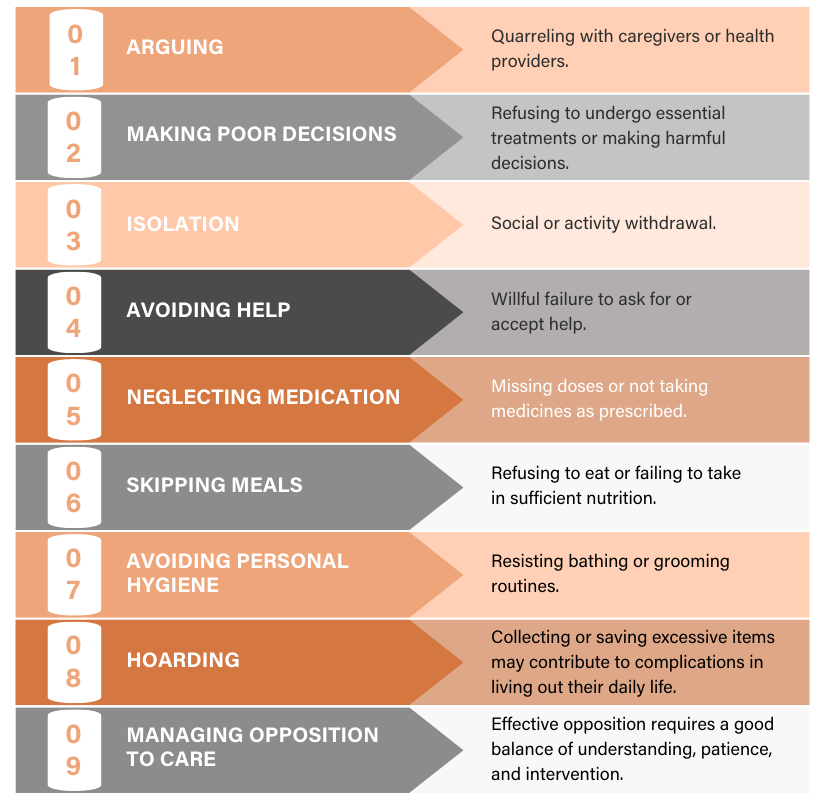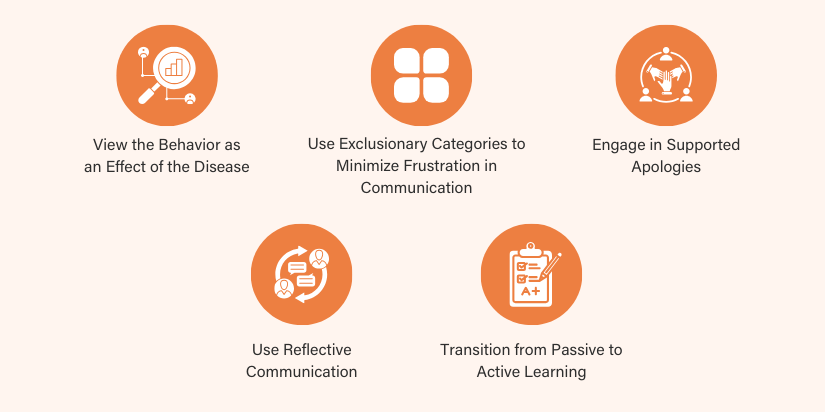
Are you finding yourself facing aggressive reactions from someone with dementia despite your best efforts to help? It can be disheartening and perplexing when your assistance attempts are met with resistance. This often happens because dementia caregivers might inadvertently trigger negative responses despite good intentions.
So, what can you do if a resident resists care? Are there effective strategies to manage this behavior and achieve a positive outcome? In this guide, we’ll explore:
By understanding these elements, you’ll be better equipped to create a more cooperative and supportive environment for those in your care.
Knowing why a senior would want to refuse assistance is an important part of being able to provide effective care. Here are some common factors that contribute to resistance.
Aging individuals may feel anxious and fearful about receiving care for several reasons. They might worry about losing their independence or becoming a burden to their family or dementia caregivers. Some fear that care might increase their risk of falling or getting injured. Additionally, concerns about what the future holds, including fears about death, can also play a role in their resistance to care.
It’s difficult for seniors to accept that they need help after managing independently for so long. Many resist care because they feel like they’re losing control over their lives. Even simple things, like needing help with grooming or moving around, can feel overwhelming to them. For some, accepting help feels like admitting they’re not as capable as they used to be.
People who have had negative experiences with dementia caregivers or institutions may find it hard to trust new dementia caregivers and resist receiving help. It can also be difficult for them to adjust to new routines and levels of care if their ability to cope is low.
Some individuals are obstinate or controlling; these traits do not change with age. If an elder has always been stubborn or oppositional, that behavior will be carried over to their senior years. Knowing the personality type will help determine how to reach them best.
Resistance can also occur due to underlying physical issues. The elderly might be in long-term pain or have an unknown and untreated medical condition. It could also be due to side effects from medication or mental health issues like depression or anxiety, which can make it hard for them to cooperate with care. Cooperation often improves when the underlying psychological or physical variable causing the resistance is identified and fixed.
There are many forms of resistance; the first step in dealing with them is to recognize them. Common types of resistance include:

A person living with dementia or other forms of health distress may, at times, display resistance to cooperation while carrying out their daily activities. Below are a few tips for dementia caregivers to deal with challenging behaviors in some key areas, such as bathing, eating, and grooming, to make caregiving for dementia people much smoother and more cooperative.
Bathing is important for staying clean and healthy. It can be challenging to help older people bathe. To make bathing easier and reduce resistance, try the following:
Nutrition plays an essential role; however, a lack of proper eating will eventually harm one’s health. Below are some dementia care tips to encourage better eating:
The elderly may also resist grooming, but the following suggestions may help increase cooperation:
Despite the change in behavior and communication, dementia care has remained tough and demanding all along. That’s why the use of appropriate strategies for dementia disease care can help maintain not only the most optimal relationship with a person living with dementia but also the best care provision. Below are the principles to guide dementia caregivers and those living with dementia.

Accepting the fact that an elderly with dementia will do many things that have never been done before is probably the most trying aspect of caregiving for dementia people. These many changes are hard to cope with emotionally and can be confusing. It is necessary to keep in mind:
By understanding that such behaviors are the direct outcome of the disease process, you will be better equipped to sustain a caring and supportive relationship with the individual living with dementia.
One of the most frustrating facts for a person living with dementia and their care partners is that the ability to understand and express oneself through language decreases over time. To reduce frustration and enhance communication:
Improve comprehension: The person can concentrate on fewer options and, therefore, have more successful and less stressful communication.
Apologize, even if you feel you are not the one in the wrong, to keep a good relationship with the person who has dementia. Apologizing doesn’t mean you’re admitting fault; it’s simply a way to maintain a positive relationship and avoid conflict. Consider the following:
Reflecting or mirroring tends to be a very powerful technique for the person who is anxious or agitated with dementia. This technique consists of the following:
To truly imbibe skills that form the crux of compassionate dementia care, one must move beyond passive home caregiver training—inwardly digesting videos or printed matter in the form of books or articles—toward active engagement. The way to do it is as follows:
There isn’t a magic formula that will be equated with better dementia disease care, but implementing these strategies into the life of someone with a changing brain will make all the difference in the world. Always keep in mind that the behaviors you see result from disease, and by supporting communication, working thoughtfully with apologies, reflective listening, and active learning, you are already way ahead in offering compassionate care. If what you’ve been doing has not been working, it’s time to do something different. It’s the next step toward becoming a more skilled and caring dementia caregiver.
Contact us to inquire about our state-wise training courses and take the first step towards upskilling your team with a 14-day free trial!